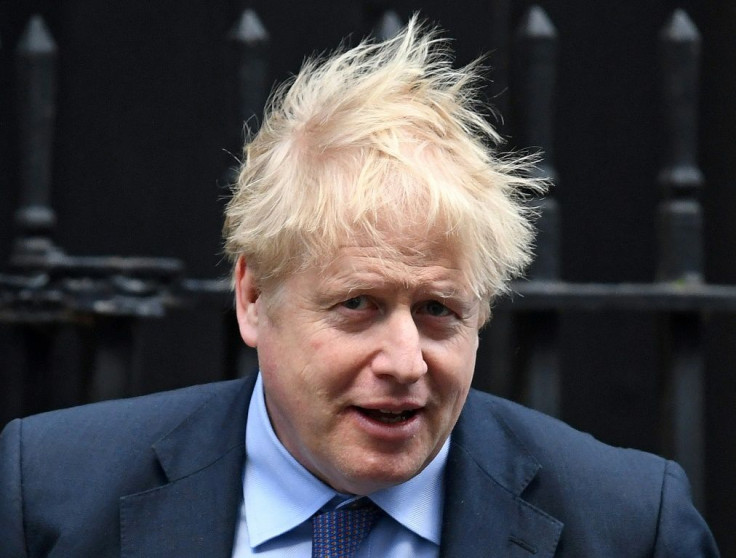UK Prime Minister Johnson Condemned Over Attempts To Rewrite Parts Of EU Withdrawal Agreement

KEY POINTS
- EU contends the “internal market” bill removes key sections of the U.K.’s withdrawal agreement from the EU
- Some Tory MPs warned that Johnson has compromised Britain's custom of fairness and adherence to law
- Johnson said the new bll is designed to protect UK markets
The admission by U.K. Prime Minister Boris Johnson’s government that it is willing to breach international law over issues related to the authority of regional governments has triggered fury both outside and inside Britain.
The new point of contention concerns the "internal market bill" – whereby the London government wants to maintain a joint market across England, Scotland, Wales, and Northern Ireland post-Brexit and also have a large say in determining the rules and regulations in governing such local matters as food, air quality, and animal welfare.
Johnson’s government said the bill is a kind of “insurance” in the event trade talks with the European Union result in no deal.
The bill also provides for “limited and reasonable steps” in order to prevent the formation of a “hard border” between EU member Ireland and Northern Ireland.
However, the local government administrations of Scotland, Wales, and Northern Ireland want more control over such decision-making without London’s influence. In addition, the U.K. government has insisted that the devolved administrations in those regions must accept goods and services from all other parts of the U.K., even if they each have different local standards on products.
As such, according to Johnson’s government’s perception, there would be a level playing field for companies across this "internal market," BBC reported.
“So Welsh farmers could sell their lamb in Belfast, Scottish whisky distilleries could buy barley from English farmers, and so on,” BBC wrote.
But the devolved administrations of Scotland, Wales, and Northern Ireland fear that this system will give Westminster too much power.
From Europe’s perspective, the “internal market” bill removes key sections of the U.K.’s withdrawal agreement from the EU which Johnson signed last year.
European Commission President Ursula von der Leyen, and the president of the European Council, Charles Michel both condemned Johnson and his government.
“Very concerned about announcements from the British government on its intentions to breach the withdrawal agreement,” Von der Leyen tweeted. “This would break international law and undermines trust.”
Michel, a former Belgian prime minister, called the new bill “unacceptable.”
“The withdrawal agreement was concluded and ratified by both sides, it has to be applied in full,” Michel tweeted. “Breaking international law is not acceptable and does not create the confidence we need to build our future relationship.”
France’s EU affairs minister, Clement Beaune declared: “Compliance with the withdrawal agreement is not negotiable. Commitments have been made, they must be implemented. Among friends and allies, we must keep our word and respect the law. The European Union is committed to it, we expect it from the United Kingdom.”
Former Prime Minister Theresa May is part of a rising opposition within the U.K. Conservative Party itself over Johnson’s handling of Brexit negotiations, Tim Ross of Bloomberg wrote.
“Tory lawmakers are furious at the government’s admission it will break international law by overriding some parts of the separation deal Johnson signed with the EU last year,” Ross wrote. “Some in his party see it as a sledgehammer tactic to scare Brussels into backing down on trade terms for fishing rights and state aid, or to start the inevitable fight that comes before a deal is reached. Either way, it’s a high-risk move. While voters at home may be more relaxed about breaches of international law than EU politicians, Johnson’s Britain is trying to carve out a new role on the global stage.”
Other Tory politicians have also attacked Johnson, including former Conservative Prime Minister John Major.
“For generations, Britain’s word – solemnly given – has been accepted by friend and foe. Our signature on any treaty or agreement has been sacrosanct,” Major said in a statement. “If we lose our reputation for honoring the promises we make, we will have lost something beyond price that may never be regained.”
Tobias Ellwood, Conservative MP for Bournemouth East and chair of the House of Commons Defence Select Committee, told BBC Radio that changes to the withdrawal agreement will make the U.K. lose its good reputation.
“This is about the rule of law and our resolve and commitment to uphold it,” he said. “To unilaterally ignore any treaty in its obligations which we’ve signed and submitted to the United Nations would actually go against everything we believe in. How can we look at countries such as China in the eye and complain about them breaching international obligations over Hong Kong, or indeed Russia over ballistic missiles, or indeed Iran over the nuclear deal if we go down this road?’
Ian Blackford, leader of the Scottish National Party for the House of Commons, condemned Johnson during parliamentary session.
“This legislation breaks international law, but it also breaks domestic law,” he said. “The Prime Minister and his friends … are creating a rogue state, one where the rule of law does not apply. Why does the [Prime Minister] think that he and his friends are above the law?’
In response, Johnson told Blackford and other critics: ‘We will press on with this bill, because I believe that these attacks on it are totally illogical. It actually represents a very substantial transfer of powers of sovereignty to Scotland, Wales and Northern Ireland. It is a massive devolutionary act. It also ensures the integrity of the U.K. internal market.’
For now, the U.K. and EU are planning emergency talks to discuss Johnson’s new proposals.
© Copyright IBTimes 2025. All rights reserved.




















